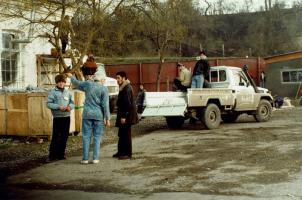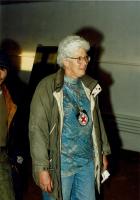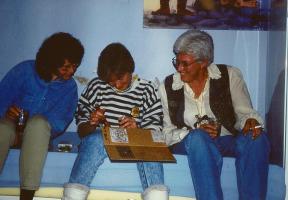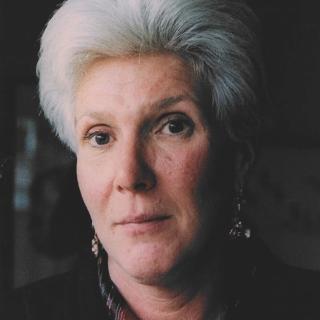Nancy Malloy was born on 6 October 1945 in Brockville, Ontario, Canada. After finishing school, she attended Kingston General Hospital School of Nursing in nearby Kingston in 1968; she went on to do a Bachelor’s in Nursing Science at Queen’s University, Kingston, the following year.
After graduation, Nancy worked for six and a half years as a nursing programme instructor at Vanier CEGEP College in Montreal. This was followed by two and a half years as an in-service educator at Maimonides Hospital and Home for the Aged (now the Donald Berman Maimonides Geriatric Centre), also in Montreal.
In 1979 Nancy moved to Vancouver where she became assistant director of surgical nursing at the city’s General Hospital. She spent six years in this role before moving to Vancouver’s UBC Hospital as administrative supervisor.
Nancy was one of a kind: radiant, passionate, full of life and energy, and exceptionally skilled. At the same time, she was down to earth and didn’t take herself too seriously. She always put others –family, friends, colleagues and patients – first. She was guided in both her private and professional lives by a strong set of values centred around helping others. This is what drove her forwards, as she sought the next challenge.
In 1987 Nancy joined the Canadian Red Cross Society, British Columbia/Yukon sector, working as a nurse and hospital administrator covering six outpost hospitals in remote areas. That same year, while working full time, she gained a Master’s in Business Administration from City University of Seattle, USA. And she didn’t stop there. At a time when she could have been forgiven for easing her foot off the accelerator, she pushed the pedal even harder, enrolling in the Red Cross international delegate training programme in 1988. She loved to travel, preferably to places off the beaten track. She also wanted to assist people affected by war.
Two years later, seconded from the Canadian Red Cross, Nancy embarked on her first ICRC assignment, working from June to September 1990 as a medical administrator based in Addis Ababa, Ethiopia. Her tasks included managing medical supplies for three surgical teams and training local staff. Even though it was her first international posting, Nancy was straightaway in her element. Her rock-solid professionalism shone through, as did her ability to get along with all and sundry. As she noted at the time, her first experience of emergency relief work left her wanting more.
The following year she was assigned to the logistics and food distribution operation in Kuwait run by the International Federation of Red Cross and Red Crescent Societies in the aftermath of the Gulf War. In between her assignments with the ICRC and the Federation, Nancy remained committed to her work with the Canadian Red Cross (and to her two beloved cats, O’Reilly and Clancy). In early 1993 Nancy rejoined the ICRC for a five-month mission to the former Yugoslavia. She was responsible for managing medical supplies in Belgrade and organizing their distribution to different hospitals and medical facilities. She again fitted in seamlessly, showing plenty of initiative. Next up was an assignment in 1995 with the Federation to Goma, Zaire (now the Democratic Republic of Congo), as a hospital and pharmacy administrator.
In September 1996 Nancy started a new assignment as a medical administrator with the ICRC, this time in the Russian republic of Chechnya. She was based in the village of Novye Atagi, some 20 kilometres south-west of the capital Grozny, where the ICRC had opened a field hospital. In the early hours of 17 December 1996, six delegates, including 51-year-old Nancy, were shot dead by masked gunmen in their rooms in the ICRC residence next to the field hospital. Like Nancy, four other murdered delegates had been seconded to the ICRC from National Red Cross Societies: Ingebjørg Foss, 42, and Gunnhild Myklebust, 50, both nurses with the Norwegian Red Cross; Hans Elkerbout, 47, a construction manager with the Netherlands Red Cross; and Sheryl Thayer, 40, a nurse with the New Zealand Red Cross. The sixth delegate was head nurse Fernanda Calado, 49, from Spain, who had worked for many years with the ICRC. Another delegate, Christophe Hensch, a Swiss national in charge of the ICRC's Novye Atagi office, was shot and survived.
Jean de Courten, the ICRC’s director of operations, called the attack a cowardly, “deliberate assassination”. Following the tragedy, the ICRC evacuated its remaining 14 delegates from Novye Atagi. Local medical staff continued to care for patients at the hospital. Speaking at a memorial ceremony at Saint-Pierre Cathedral, Geneva, just days after the attack, ICRC President Cornelio Sommaruga said: “All six were dedicated to the ideal of solidarity with the victims of the Chechen conflict. They were fulfilling with exemplary enthusiasm the original mission of the Red Cross – to care for wounded – and they were doing it in the same spirit as the women of Solferino: ‘Tutti fratelli’ [We are all brothers].”
Nancy received several posthumous awards, including the Florence Nightingale Medal in recognition of her exemplary service, courage and devotion to the wounded and sick. In September 1997 Canada’s governor general, Roméo LeBlanc, awarded her the Meritorious Service Medal in honour of her service and sacrifice. A Monument to Canadian Aid Workers was unveiled in Rideau Falls Park, Ottawa, in June 2001, in honour of Nancy and fellow humanitarian aid worker Tim Stone. She received the Order of the Red Cross the same year. In 2015 her friends and former classmates honoured her memory through the Nancy Malloy Memorial Award, administered by the Queen’s University School of Nursing.
Nancy had a sparkle and zest for life that accompanied her wherever she went, and which was felt by everyone she met. She simply loved what she was doing: being a nurse and a humanitarian, and helping others. It was everything to her.



